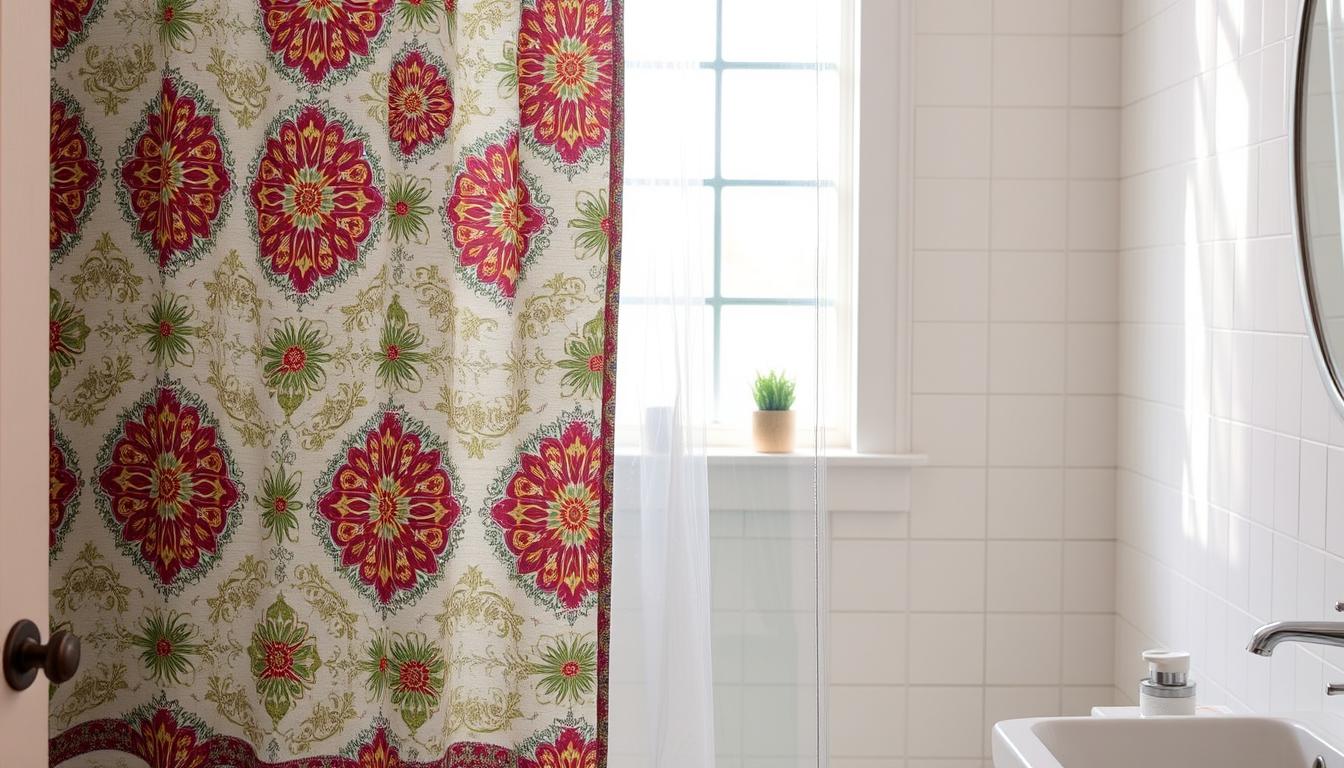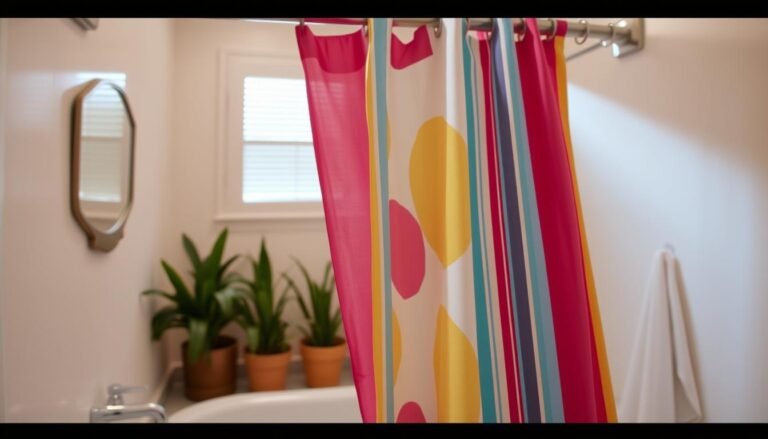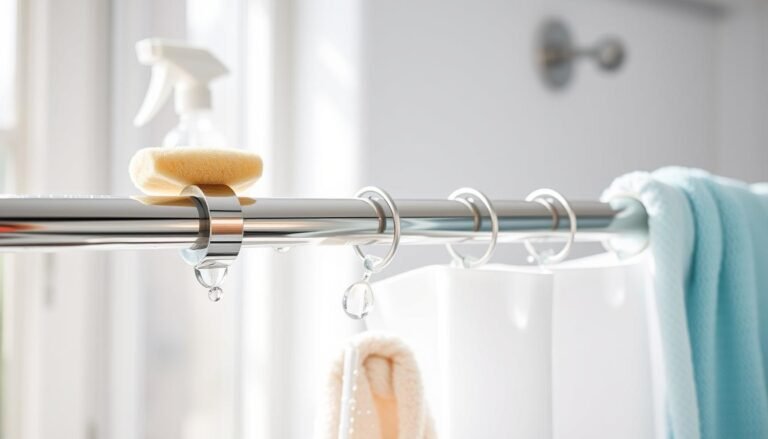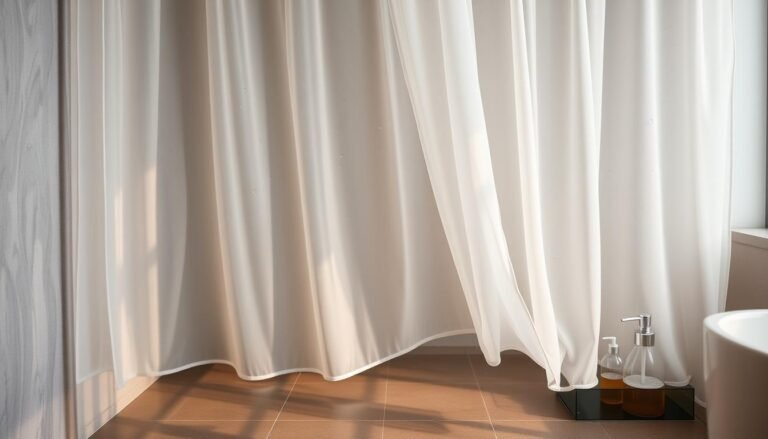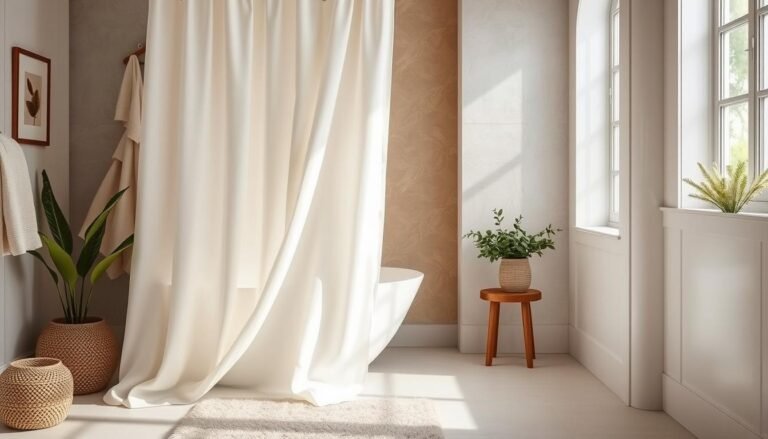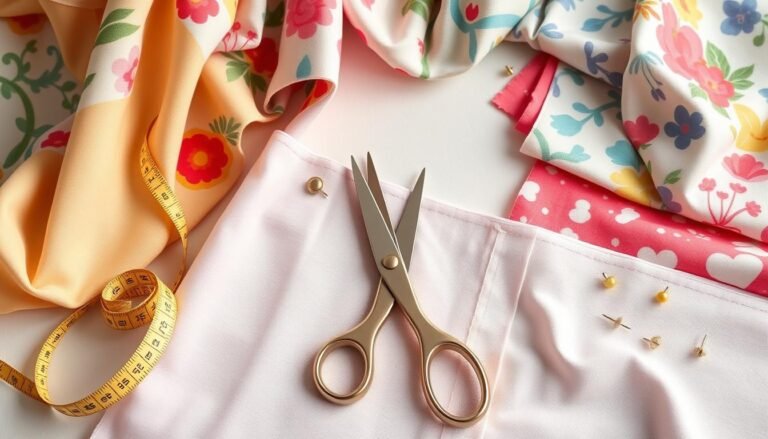Fabric Shower Curtains: Is a Liner Necessary?
Fabric shower curtains bring style and function to bathrooms. Many wonder if they need a fabric shower curtain liner. High-quality curtains like those from cotton canvas or nylon canvas manage water well. They keep it inside the tub.
Adding a liner provides extra protection but isn’t always a must. Some lightweight fabric shower curtains work fine without one. This makes them easier to handle. Yet, in damp bathrooms, a liner might still be a good idea.
The curtain’s make-up matters. A blend of 55% cotton and 45% polyester strikes a balance. It’s durable and resists water. Keeping your curtain clean helps avoid mildew and soap scum. This knowledge aids in deciding on the need for a liner.
Understanding the Need for Shower Curtain Liners
Shower curtain liners are vital for keeping your bathroom dry and clean. They stop water from spilling out and keep mildew at bay. When choosing between fabric and plastic options, consider their benefits and uses.
What is a Shower Curtain Liner?
A shower curtain liner acts as a water-repellent shield. It’s made from materials like plastic or fabric. This liner maintains the bathroom’s dryness by containing water in the tub area. Plastic liners are common but may release unpleasant odors. PEVA and EVA liners are better as they emit fewer chemicals.
Functions of a Shower Curtain Liner
Shower curtain liners have several key roles. They keep the main curtain dry to prevent mold. This is crucial for cloth curtains, which don’t resist water well. Liners also guard against soap scum. They’re cheaper than fabric curtains, making them easy to replace.
- Water protection: Keeps water confined to the shower or tub.
- Mildew prevention: Dries the fabric, lowering mildew and mold risk.
- Protects decorative curtain: Stops soap and dirt from reaching the outer curtain.
- Easy replacement: Affordable, with some PVC options as low as $1.
- Health considerations: PEVA and EVA liners are safer than vinyl.
Fabric liners look nice but need frequent cleaning to stop mildew. They also wear out faster. PEVA and EVA liners are both eco-friendly and long-lasting, offering good water resistance.
Do Fabric Shower Curtains Need a Liner?
When deciding on needing a liner for fabric shower curtains, consider the fabric type. Some materials are waterproof and don’t need a liner. Others do better with a liner for extra protection.
Depends on the Fabric Type
Not every fabric shower curtain needs a liner. The material matters a lot. Polyester is good for showers because it is waterproof and strong. But cotton curtains, while fancy, need liners for protection and cleanliness.
Stores like Bed Bath & Beyond and Walmart sell lightweight curtains that don’t need liners. Choosing the right fabric is key to not needing an extra liner.
Benefits of Using a Liner
Even waterproof curtains can benefit from using a liner. Liners add extra defense against water. They keep your main curtain mold and mildew-free. Plus, they are cheap and easy to swap, helping your curtain last longer.
Liners fit inside the tub while the fabric curtain hangs outside looking nice.
Common Misconceptions
Some people think liners with fabric curtains are not necessary. Yet, for some non-waterproof fabrics, liners keep them durable and clean. It’s wrong to say liners are only for plastic curtains. They work well with fabric types too.
For extra bathroom tips, read this guide on pool covers and fences.
Best Fabric Shower Curtains That Don’t Require Liners
Shopping for fabric shower curtains? Choose ones that don’t need a liner for easier use and a neater bathroom look. Cotton canvas and nylon canvas shower curtains are top picks. They’re durable and waterproof, so water stays in the shower. This means you don’t need an extra liner.
Cotton Canvas Shower Curtains
Cotton canvas shower curtains are thick and prevent water from escaping. People love them for their mix of style and practicality. They have a natural look that fits many bathroom styles. Plus, they’re often treated to resist water better, making them great for going liner-free.
Nylon Canvas Shower Curtains
Nylon canvas shower curtains are light but strong. They offer a modern look and keep water in the shower effectively. Nylon is also easy to keep clean and doesn’t hold odors. Its low maintenance and ability to work without a liner make it a popular choice.
Recommended Brands and Models
Some brands are known for the quality and effectiveness of their fabric shower curtains. Hookless is celebrated for its waterproof option with a washable liner, meaning it’s easy to care for. Quiettown is another excellent choice, with heavy-duty curtains that have weighted bottoms to stay in place and seal water in.
| Brand | Model | Price | Features |
|---|---|---|---|
| Hookless | Hookless Fabric Shower Curtain | $38 | Washable liner, durable |
| Quiettown | Heavy-Duty Fabric Curtain | $42 | Weighted hem, waterproof |
| Walmart | Fabric Shower Curtain Liner | $13 | Budget-friendly, coated fabric |
To find the best fabric shower curtains, look at the material and its waterproof feature. Choose top brands for a good, liner-free shower. This will assure you get the best out of your purchase.
Fabric Shower Curtain Waterproof Capabilities
When you pick a fabric shower curtain liner, checking its waterproof feature is key. The material quality largely affects its ability to repel water. A good waterproof curtain stops mold and mildew by keeping moisture away.
Various materials bring different water protection levels to shower curtains. Polyester curtains, for example, push water away and are easy to clean. Organic options like cotton and linen are good for the planet and look nice too. Organic cotton choices support eco-friendly living while keeping your shower dry.
Treatments and coatings can make fabric curtains more resistant to water. Ironing them after washing can bring back their water-repellent nature. Keeping a curtain clean and dry helps it last longer and stay effective.
Many hotels choose fabric curtains for their quality. This makes people switch from plastic to fabric. Yet, some users dislike how the fabric sticks to them. A curved shower rod and good air flow in the bathroom can solve this problem.
Different people have various opinions on fabric shower curtain liners. The market has options for everyone. Choices range from mold-resistant linen to eco-friendly PEVA. Fabric curtains are a versatile and green choice, offering great water protection.
Pros and Cons of Fabric vs Plastic Shower Curtain Liners
Choosing between fabric and plastic shower curtain liners means considering durability, environment, and cost. Each type has its own advantages and downsides. Your final choice will hinge on your specific needs.
Durability Comparison
Fabric curtain liners often outlast plastic ones. They are made of polyester or nylon which resists tears well. Such materials also survive regular washes better, prolonging their use.
On the other hand, plastic liners are less sturdy. They can tear easily and might need replacing often, especially if mold appears or stains set in.
Environmental Impact
Nowadays, picking eco-friendly shower liners is crucial. Fabric liners are better for the environment because they last longer and don’t have harsh chemicals. Unlike certain plastic liners, they don’t emit toxic VOCs. This is a win for those seeking green solutions.
PEVA plastic liners are a bit better for the planet. They are chlorine-free and somewhat recyclable. Yet, they still can’t beat fabric liners in eco-friendliness.
Cost-Effectiveness
Plastic liners are cheap at first, costing between $8 and $42. They’re easy to get and replace, which is good for short-term use. But fabric liners last longer, proving to be a better investment over time. You won’t need to replace them as much.
Fabric liners also improve your shower’s look and feel. They come with benefits like fighting mildew, heavy edges, and sizes that fit your shower better. Even though they cost more at first, they offer better value because they last longer and are kinder to the planet.
Deciding on fabric or plastic depends on what you value more: durability, being green, or saving money upfront. You can learn more by checking this guide.
Tips for Buying Fabric Shower Curtains
Choosing the right fabric shower curtain is crucial for your bathroom’s look and use. It’s vital to focus on the type of material. Fabrics like cotton blends, microfiber, and polyester each have their advantages. For example, polyester and microfiber resist water and last longer. They help keep mold and mildew away. Cotton blends, however, are easy to care for. They come in many colors and styles. Knowing about these materials will help you decide wisely.
Choosing the Right Material
In choosing a fabric for your shower curtain, think about how it handles water and if it lasts long. Polyester and nylon are good because you can wash them in a machine. This makes them easy to keep clean. Cotton curtains offer many colors and are very flexible. But, they might need washing more often. It’s important to pick materials that resist mold and mildew. This keeps the curtain fresh longer. Also, think about how the curtain stays in place. Options like magnets or suction cups can make a difference.
Design and Aesthetic Considerations
The design of your shower curtain greatly impacts the bathroom’s vibe. Matching the curtain with towels and bathroom accessories makes everything look coordinated. This makes the space more pleasant. A bold curtain can add style to a small bathroom. Solid colors, though, bring a subtle elegance. Also, hookless curtains are trendy for their convenience and modern appearance. Don’t forget to check the size (72” x 72”) so it fits well and stops water from spilling.

Hey there, I’m Alex Hanson and I’m passionate about all things covers! Whether you’re looking for a car seat cover to protect your vehicle or an oven cover to keep your kitchen clean, I’m here to help. With years of experience in the industry, I have plenty of knowledge and insights to share with my readers. So, if you care about protecting your belongings and making them look their best, you’re encouraged to read my blog as I explore the perfect cover for every need.

